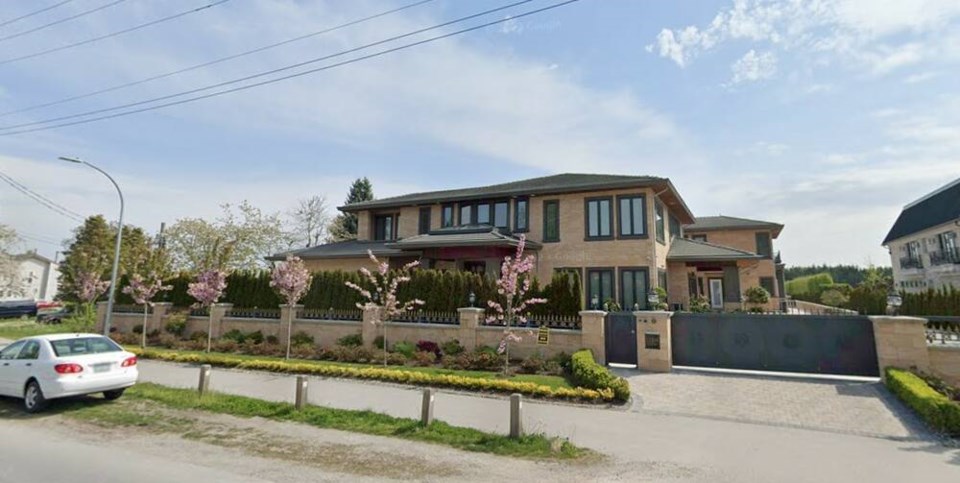A Richmond home builder, who prefers verbal contracts with no paper trail, managed to win $1.4 million for two axed luxury properties in Richmond and West Vancouver.
Yongfeng Enterprises was hired in 2015 by a couple to build a house on No. 2 Road in Richmond, just south of Steveston Highway, and also a house at 1360 Ottaburn Road in West Vancouver.
The builder made only a verbal agreement for the Richmond property but did have a written one for the West Vancouver home, both for Yu Na Song and Bo Wei.
According to the contract, the West Vancouver house would cost around $1.2 million to build.
Yongfeng told the court the house was an investment property, according to the Weis, while the Weis claimed the property was initially meant to be the daughter’s home, but they sold it because they were “unhappy” with the construction.
Later in the year, Yongfeng - which is owned by Feifei Ren and Shao Ming Wang - was brought on to work on another house in Richmond, 11266 No. 2 Road, without a contract in place.
According to Yongfeng’s owner, Wang, he met the Weis several times to negotiate a contract for the Richmond project and told them he did not want to start construction without a signed contract. The Richmond house would cost around $4.5 million to build.
He started construction anyway after Wei, who was in China at the time, told him the contract was approved and he would sign it later when he returned to the country. Wei also sent him a deposit for the project.
The Weis, however, had a different version of events.
They told the court they never agreed to Yongfeng building the Richmond house and said they wanted to assess the builder’s performance with the West Vancouver house before committing to the contract.
“They testified that their verbal agreement with (Yongfeng’s owner) for the Richmond house was that Yongfeng could begin the initial phases of construction, such as excavation, foundations and framing,” reads Justice Simon Coval’s decision at the B.C. Supreme Court.
“Mr. Wei said he saw this as letting Yongfeng ‘temporarily do the job.’”
Payment disputes
The West Van house was put up for sale in late 2016 and the Weis refused to pay Yongfeng’s final invoice.
According to Yongfeng, the Weis also “consistently breached their payment obligations under the Richmond (contract) by paying too little, too late.”
“In their testimony, the Weis acknowledged paying less than Yongfeng’s demands, but Mr. Wei said this was because he felt Yongfeng was overcharging,” reads Coval’s decision.
Despite receiving payment less than the outstanding amount, Yongfeng told the court it kept working based on Wei’s reassurances “that he would pay in full once he had the money available.”
Yongfeng said the parties met in April 2017 to amend the agreement and restructure payment obligations to “help mend the relationship.”
Wei denied this ever happening, but his wife, Song, said she did remember going to Yongfeng’s office and the amended agreement being drawn up. The parties did not sign the amended agreement.
Around May 2017, the Weis decided to hire a quantity surveyor because they were dissatisfied with the cost and progress of the Richmond construction. Yongfeng testified it was agreeable to doing so.
A quantity surveyor was hired without Yongfeng’s input, who valued the existing work at around $1.55 million, contrary to the $1.9 million the Weis had paid so far.
When the parties disagreed over the valuation, they stopped talking to each other and Yongfeng stopped working on the Richmond house.
The Weis got a lawyer in July 2017, claiming Yongfeng “abandoned the Richmond construction in January and wrongfully requested payments." They ended up taking Yongfeng to court in October.
Conflicting accounts with no paper trail
The two parties provided “fundamentally different” versions of events at trial and their credibility was a key consideration for Judge Coval.
“There are no contemporaneous written communications about the key decisions and events in the parties’ business relationship,” wrote Coval.
He added Wei claimed he “did not have email and did not write letters.”
Wang, on the other hand, claimed he was “happy to communicate only verbally with clients who preferred it” and found resolving payment disputes with clients in person or over the phone “friendlier” than written correspondence.
Judge Coval ultimately sided with the contractor, finding the Weis “knowingly testified to a false version of events designed to avoid the legal effects of the contract they agreed to.”
Coval added it’s unlikely for the parties to agree to an informal and vague arrangement, and for Yongfeng to work on the Richmond house for almost a year while being underpaid if it didn’t believe it would get $4.5 million for building the entire house.
Coval agreed with the Weis that it was “highly unusual for experienced business people” like Yongfeng’s owners to take on a $4.5 million project based on “an unsigned contract and promise over the telephone” without a paper trail.
However, he found it is exactly what happened based on the strength of the evidence.
The Weis will have to pay Yongfeng $1.15 million for unpaid work and lost profits related to the Richmond house, and $240,000 for unpaid work and extras at the West Van house.



